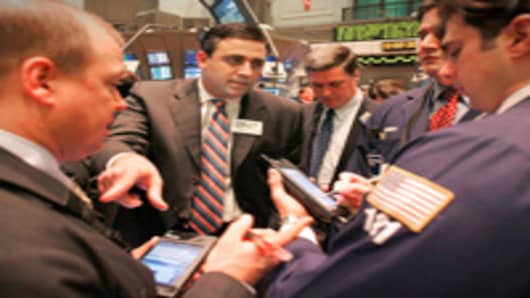The stock market collected on its rate-cut IOU today from the Fed, but it didn't end up changing the mood on Wall Street.
Stocks rallied shortly after the Federal Reserve delivered on its anticipated half-point cut in the Fed funds rate. But as in previous sessions, the rally quickly reversed itself and stocks ended down for the day.
"Now that you've had that rally ... I think that most of the steam has been taken out of a post-Fed bounce," said Mike Burnick, director of research for Weiss Capital Management in Palm Beach Gardens, Fla.
He added that the market has been in a mode of "buy on the rumor, sell on the news" that was apt to lead to more selloffs.
- Read Text of the Fed's Decision
- Europe, Japan May Follow
As part of an aggressive strategy to push banks into more lending, the central bank has slashed its main lending rate to 1.0 percent, so it doesn't have much room left before it runs out of rate-cut ammunition.
While the market saw the rate move as necessary to help investor psychology, the impact is reduced by the real effect that it will have beyond market psychology.
The Fed rate is already at a negative level in real terms—compared to inflation—so other than its sway over the prime rate of lending that affects credit card holders, there's little real economic benefit until banks ease their lending policies.
It's a reality not lost on Wall Street.
"If people can't go and take advantage of those rates, then what good is it to have them?" says Dennis P. Barba Jr., managing partner at of The Oxford Group of Raymond James in Cleveland. "If the Fed's going to lower rates without business having access to borrow capital at a reduced prime rate, it's not going to do anything to spur economic activity and keep recession at a minimum."
Consumers also are getting pinched by the lack of credit and the slowdown in the economy, another factor mitigating the effects of the Fed rate cut on stocks.
"Individual consumers are pretty much choking on debt as it is," Burnick says. "They're going to be reluctant to spend. In that kind of environment, the cost of money isn't really a factor."
So while some buyers step cautiously back into the market, few are pinning the hopes of a market recovery on the Fed's monetary policy.
"This stuff's always priced in," says Matthew Tuttle, president of Tuttle Wealth Management in Stamford, Conn. "If they cut 1 percent or three-quarters of a percent or don't cut at all, we may see that moving markets. If it's just what everyone expects, no big deal."


